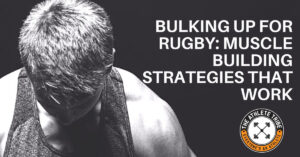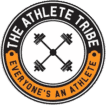Hey there Tribe!
As a performance coach who has supported amateur and professional rugby players and professionals in their quest for improvement, I know that bulking up and building muscle is a game-changer. In this blog post, we’ll dive into the muscle-building strategies that work specifically for rugby players like you.

Understanding the Importance of Muscle Building for Rugby
Power and Performance on the Field
Regarding rugby, strength and power go hand in hand. The game’s physical demands require you to be explosive, agile, and capable of powerful movements. Building lean muscle mass enhances your performance and reduces the risk of injuries. With a solid muscular foundation, you can deliver crushing tackles, break through tackles, and maintain your endurance throughout the game.
Setting Goals and Assessing Individual Needs
Define Your Goals Before embarking on your muscle-building journey, setting specific and realistic goals is crucial. I have worked with some players that want to put 10 kg of muscle mass on in 3 months. That does not happen.
Assess what areas of your physique you want to focus on and how much muscle mass you aim to gain. Setting clear objectives will help you stay motivated and track your progress effectively.
Individualised Assessments
As a performance coach, I believe in the power of individualised assessments. By analysing your strengths and weaknesses, we can identify areas that require improvement and tailor a training program specifically for you. Whether addressing muscular imbalances, enhancing explosive power, or improving overall strength, personalised assessments lay the foundation for success.
Designing a Comprehensive Training Program
The Building Blocks of Muscle To pack on muscle mass effectively, your training program must incorporate the right combination of exercises and techniques.
Resistance Training for Strength and Size Resistance training forms the cornerstone of muscle building
Focus on compound exercises that engage multiple muscle groups simultaneously, such as squats, deadlifts, bench presses, and rows. These exercises promote functional strength and mimic the movements you make on the rugby field. Aim for a combination of heavy lifts and moderate to high reps to stimulate muscle growth and increase strength.
Progressive Overload:
Pushing Your Limits Progressive overload is critical to continuous muscle growth. By gradually increasing your workouts’ intensity, volume, or frequency, you challenge your muscles to adapt and grow stronger. Keep a training journal to track your progress and ensure you’re consistently pushing yourself outside your comfort zone.
Form and Technique:
The Path to Success While it’s tempting to focus solely on lifting heavier weights, never compromise on proper form and technique. Performing exercises with the correct form not only prevents injuries but also ensures that you’re targeting the intended muscles effectively. If you’re unsure about proper technique, consider working with a qualified coach or trainer who can guide you.
Check out our video on how to design a programme here
The Vital Role of Rest and Recovery
When it comes to muscle building, growth and adaptation, rest and recovery are often overlooked but are absolutely crucial for rugby players seeking to bulk up and perform at their best. In the pursuit of building muscle, it’s important to understand that the actual growth and repair occur during periods of rest, not solely during intense training sessions. Here, we’ll explore the significant role of rest and recovery in muscle growth and adaptation for rugby players.
Understanding Muscle Breakdown and Repair
During intense training sessions and rugby matches, your muscles undergo stress and experience microtears. This process is known as muscle breakdown. While it may sound counterintuitive, these microtears are actually necessary for muscle building and growth. When you rest and allow your body time to recover, it repairs these microtears, leading to stronger and larger muscle fibers.
Hormonal Balance and Recovery
Rest and recovery also play a vital role in maintaining hormonal balance, which is critical for muscle growth and adaptation. Intense training sessions can temporarily elevate cortisol levels, a stress hormone that, if chronically elevated, can have a negative impact on muscle growth and recovery. Adequate rest and recovery periods help regulate cortisol levels, allowing your body to return to a balanced state and promote optimal muscle growth.
Quality Sleep for Optimal Recovery
One of the most important aspects of rest and recovery is getting sufficient, high-quality sleep. During sleep, your body releases growth hormone, a key factor in muscle repair and growth. Aim for 7-9 hours of uninterrupted sleep each night to maximize the benefits of growth hormone release and facilitate optimal muscle recovery.
Active Recovery and Rest Days
While complete rest is essential for recovery, active recovery and rest days are equally important. Active recovery involves engaging in low-intensity activities, such as gentle stretching, foam rolling, or light cardiovascular exercise. These activities help increase blood flow to the muscles, promoting nutrient delivery and waste removal, which aids in the recovery process. Additionally, incorporating rest days into your training schedule allows your muscles to fully recover and adapt to the stresses imposed during workouts.
Nutrition Strategies for Muscle Building
Fuel Your Muscles for Growth To support muscle building, you must provide your body with the right fuel.
Protein:
The Building Blocks of Muscle Protein play a vital role in muscle repair and growth. Aim to consume high-quality protein sources with each meal, such as lean meats, fish, poultry, dairy, eggs, legumes, and tofu. Consider dividing your protein intake evenly throughout the day to optimise muscle protein synthesis.
Carbohydrates:
Energy for Performance Carbohydrates are your primary energy source, especially during intense training sessions and rugby matches. Opt for complex carbohydrates like whole grains, fruits, vegetables, and legumes to sustain energy levels. Feel free to include some simple carbohydrates, such as fruits or sports drinks, in your pre-and post-workout meals for quick energy replenishment.
Healthy Fats:
Essential for Hormonal Balance Don’t neglect healthy fats in your diet. They play a crucial role in hormone production and overall health. Include sources like avocados, nuts, seeds, olive oil, and fatty fish in your meals to ensure a well-rounded nutrition plan.
Supplementation for Enhanced Muscle Building
Supplements as Performance Boosters While supplements aren’t mandatory for muscle building, they can complement your efforts and support your goals.
Protein Powder: Convenient and Efficient Protein powders can be a convenient way to increase your daily protein intake, especially if you struggle to meet your requirements through whole foods alone. Choose a high-quality protein powder that suits your preferences, such as whey, casein, or plant-based options.
Creatine: Boosting Power and Strength Creatine is a well-researched supplement that can enhance power and strength, making it a popular choice among rugby players. Consult with a healthcare professional before adding creatine or any other supplements to your regimen to ensure they align with your specific needs and goals.
Monitoring Progress and Making Adjustments
Track, Assess, and Adapt Monitoring your progress is essential for evaluating the effectiveness of your training and nutrition strategies. One of the best ways is to take pictures each week, and then review at the end of the month.
Measurements and Performance Assessments Measurements such as body weight, body fat percentage, and circumferences can provide valuable insights into your progress. Additionally, regular performance assessments, such as strength tests, speed trials, and agility drills, can help gauge your functional improvements on the field.
Ongoing Support and Communication As a performance coach, my role extends beyond providing guidance—it’s about fostering a supportive relationship. Regular check-ins and open communication allow us to make necessary adjustments to your training program and nutrition plan, ensuring you stay on the right track toward achieving your goals.
Congratulations, tribe!
By incorporating these muscle-building strategies into your training regimen and fueling your body with the right nutrients, you’re well on your way to becoming a force to be reckoned with on the rugby field. Remember, building muscle takes time and dedication, but the rewards are worth it. Stay focused, stay committed, and embrace the journey of transforming into the strongest version of yourself. Let’s dominate that field together!
Lee
Interested in joining the athlete tribe. Drop us a message. Good luck in your preseason, it all starts with foundations.
